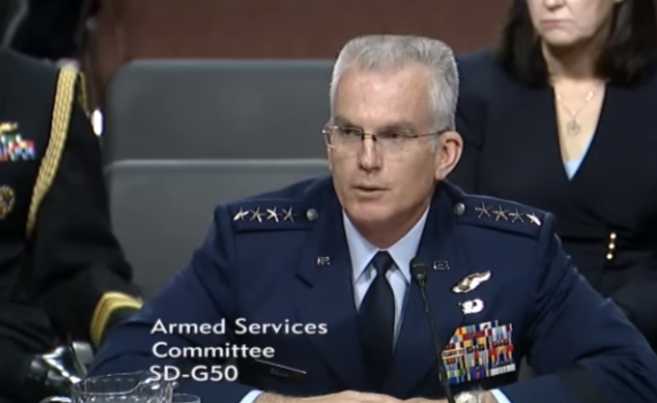 WASHINGTON — A top military general says that one of the main reasons that the U.S. Department of Defense has decided to delay implementation of the Obama-era policy allowing “transgenders” to serve in the military is disagreement over the science of how the medical treatments for those struggling with gender dysphoria alleviate the problem.
WASHINGTON — A top military general says that one of the main reasons that the U.S. Department of Defense has decided to delay implementation of the Obama-era policy allowing “transgenders” to serve in the military is disagreement over the science of how the medical treatments for those struggling with gender dysphoria alleviate the problem.
Air Force Gen. Paul Selva was asked about the matter by Sen. Kirsten Gillibrand, D-NY, on Tuesday during a Senate Armed Services Committee hearing.
“I am concerned that the recent six-month delay the Department has approved before letting transgender people enlist in the services will have some unintended consequences,” Gillibrand stated. “What have you learned so far in your review of this issue, and how is the implementation going so far?”
“I am an advocate of every qualified person who can meet the physical standards to serve in our uniformed services to be able to do so,” Selva replied. “Our decision to delay the accessions of transgender individuals into the services was largely based on a disagreement on the science of how mental health care and hormone therapy for transgender individuals would help solve the medical issues that are associated with gender dysphoria.”
“There are a host of other issues that involve the potential physical standards, and the service chiefs asked for additional time to assess so that they can make their necessary changes to infrastructure, as well as training curriculum for our basic trainees who come in in transgender status—particularly those who have not undergone gender reassignment surgery and while they present as their target gender are physiologically still in their birth gender,” he added.
He said that those issues must be addressed before the military can allow those who identify as the opposite sex to enter the U.S. Armed Forces.
As previously reported, U.S. Defense Secretary James Mattis announced earlier this month that the Pentagon would push back its implementation date to Dec. 1 to give additional time to determine whether or not the Obama-era policy will negatively affect military readiness.
“After consulting with the service chiefs and secretaries, I have determined that it is necessary to defer the start of accessions for six months,” he outlined in a memo. “We will use this additional time to evaluate more carefully the impact of such accessions on readiness and lethality.”
However, Mattis also advised that the delay “does not presuppose the outcome of the review.”
Christian and family groups opine that Mattis should do away with the policy altogether.
“Spending billions of dollars on transgender surgeries and treatment plans, when the military has other priorities that would actually ensure its effectiveness in war, is irresponsible,” said Lt. Gen. (Ret.) Jerry Boykin, who now works with Family Research Council.
“However, the cost to readiness, recruitment, retention, morale and cohesion will be even greater,” he continued. “Secretary Mattis and Congress need to ensure the priorities of the U.S. armed forces remain those that the secretary has outlined: mission readiness, command proficiency, and combat effectiveness. These should be the new priorities, not the last administration’s social engineering projects that ignore military readiness.”
Become a Christian News Network Supporter...


